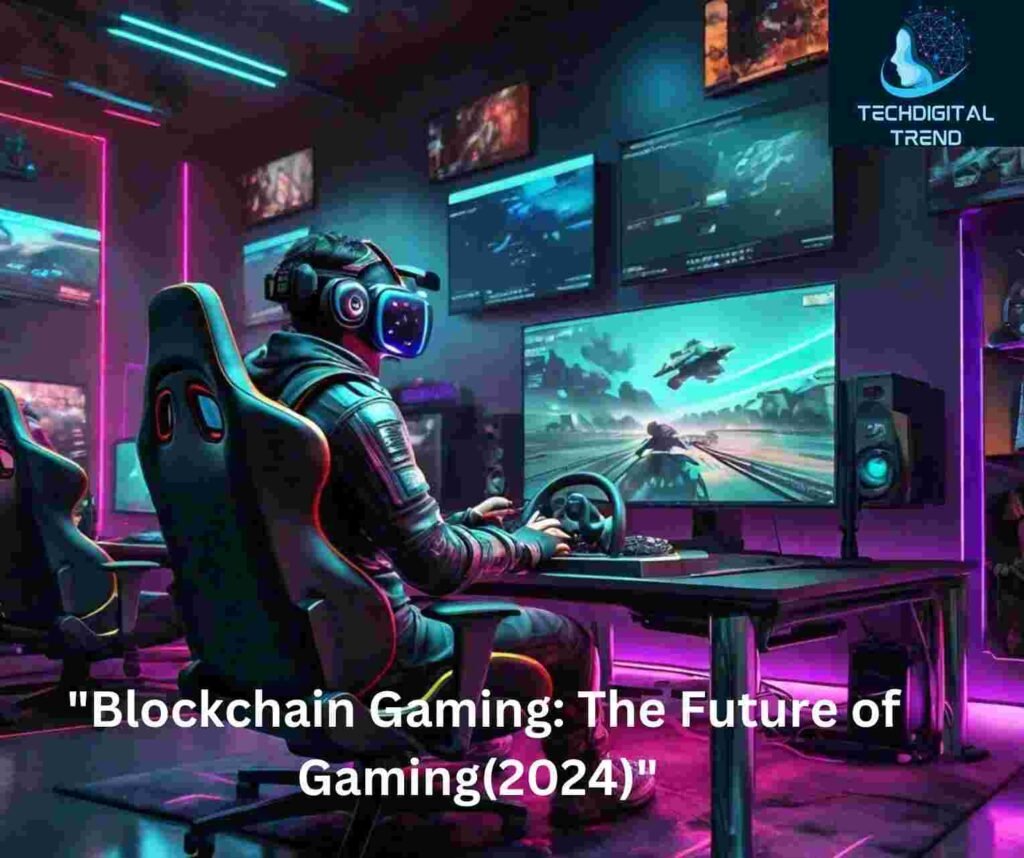Table of Contents
ToggleBlockchain Gaming
Blockchain gaming is a novel idea that blends the thrill of gaming with the immutability and transparency of blockchain technology. New games are always being released, and it has been increasingly popular in recent years. Blockchain gaming establishes a decentralized and transparent gaming environment with the use of cryptocurrencies and non-fungible tokens (NFTs).
With the introduction of blockchain technology, the gaming industry has seen a tremendous change in recent years. Blockchain was first developed to facilitate cryptocurrencies like Bitcoin, but it has now spread to other industries, including gaming. A new paradigm that has great potential for the future has emerged in the gaming industry as a result of the combination of blockchain technology with gaming. We’ll discuss the advantages, difficulties, and possible impact of blockchain gaming on the future of gaming in this blog. How Blockchain is Used in Gaming
Blockchain technology is used in gaming to create a decentralized and transparent ecosystem. It enables the creation of unique digital assets, such as non-fungible tokens (NFTs), which can be used in games. Blockchain also allows for secure and transparent in-game transactions, creating a fair and trustworthy gaming experience.
Understanding Blockchain Gaming
To understand blockchain gaming, let’s first break down the two components: blockchain and gaming.
In its most basic form, blockchain is a decentralized distributed ledger system that records transactions across several computers while guaranteeing immutability, security, and transparency. A timestamp, transaction information, and a cryptographic hash of the preceding block are all included in each block of the blockchain.
On the other hand, playing video games on a computer, mobile device, or console is referred to as gaming. There are millions of gamers worldwide, and gaming has been a popular source of entertainment for decades.
As the name implies, blockchain gaming blends elements of gaming with blockchain technology. It offers innovative economic models that let players to derive real-world value from their gaming experiences, transparent and secure transactions, and decentralized ownership and management of in-game assets.
Types of Blockchain Games
- There are several types of blockchain games, including:
- NFT Games: Games that use non-fungible tokens (NFTs) as unique digital assets.
- Crypto Games: Games that use cryptocurrency as a form of payment or reward.
- Decentralized Games: Games that are built on blockchain technology and are decentralized.
- Play-to-Earn Games: Games that reward players with cryptocurrency or NFTs for playing.
- Blockchain-Based Esports: Esports platforms that use blockchain technology to create a decentralized and transparent ecosystem.
- Virtual Reality Games: Games that use blockchain technology to create immersive virtual reality experiences.
- Augmented Reality Games: Games that use blockchain technology to create immersive augmented reality experiences.
- Multiplayer Online Battle Arena (MOBA) Games: Games that use blockchain technology to create decentralized and transparent MOBA experiences.
Popular Blockchain Games
Some popular blockchain games include:
- Decentraland: A virtual reality game built on blockchain, allowing players to create and monetize their own content.
- The Sandbox: A decentralized gaming platform that allows players to create and sell their own games.
- Axie Infinity: A blockchain-based game that allows players to collect and breed unique digital creatures.
- Crypto Kitties: A blockchain-based game that allows players to collect and breed unique digital cats.
- Gods Unchained: A blockchain-based trading card game that rewards players with cryptocurrency.
- The Forge: A blockchain-based game that allows players to create and sell their own NFTs.
- Ember Sword: A blockchain-based game that allows players to create and sell their own NFTs.
Benefits of Blockchain Gaming
The benefits of blockchain gaming include:
- Ownership: Players have full ownership of their digital assets, which can be bought, sold, and traded.
- Transparency: Blockchain technology provides a transparent and secure gaming experience.
- Decentralization: Blockchain gaming is decentralized, meaning that there is no central authority controlling the game.
- Monetization: Blockchain games provide new monetization opportunities for game developers.
- Security: Blockchain technology provides a secure gaming experience, protecting players’ assets and data.
- Immersive Experience: Blockchain games provide a more immersive experience, allowing players to interact with each other and the game environment in new ways.
- Community Building: Blockchain games provide a sense of community, allowing players to interact with each other and build relationships.
Challenges of Blockchain Gaming
While blockchain gaming has many benefits, it also faces some challenges, including:
- Scalability: Blockchain technology can be slow and costly, making it challenging to scale.
- Regulation: The regulation of blockchain gaming is still unclear, creating uncertainty for game developers.
- Adoption: Blockchain gaming requires a certain level of technical knowledge, which can be a barrier to adoption.
- User Experience: Blockchain games can be complex and difficult to use, which can be a barrier to adoption.
- Cost: Blockchain games can be costly to develop and play, which can be a barrier to adoption.
- Security Risks: Blockchain games are at risk of security breaches and hacks, which can result in the loss of assets and data.
Future of Blockchain Gaming
With new games and technologies being produced on a daily basis, the future of blockchain gaming is bright. We may anticipate further breakthroughs and developments in blockchain gaming as the sector expands.The future of blockchain gaming is bright, even in spite of these obstacles. Anticipate a rise in inventive blockchain games that push the limits of what’s possible in gaming as scaling solutions advance and blockchain technology continues to grow.
One exciting trend in blockchain gaming is the integration with the metaverse, a collective virtual shared space that is created by the convergence of virtually enhanced physical reality and physically persistent virtual reality. The metaverse promises to revolutionize the way we interact with digital environments, offering new opportunities for socialization, commerce, and entertainment.
Play-to-earn models, in which users may obtain real-world value by engaging in games and supporting the development of the gaming ecosystem, are becoming more and more popular in blockchain gaming. Players will be able to monetise their in-game abilities and time, which might revolutionize the gaming business.
Conclusion
blockchain gaming is a fast expanding industry that blends the thrill of gaming with the immutability and transparency of blockchain technology. Players may fully control their digital assets thanks to its decentralized and transparent environment, which also pays them in cryptocurrencies or NFTs.
The positives of blockchain gaming, such as security, immersiveness, and community building, make it an attractive technology with a lot of potential, despite its issues with scalability, regulation, and acceptance. We should anticipate further developments and breakthroughs in blockchain gaming as the sector expands.
Open this link: Tap to here















